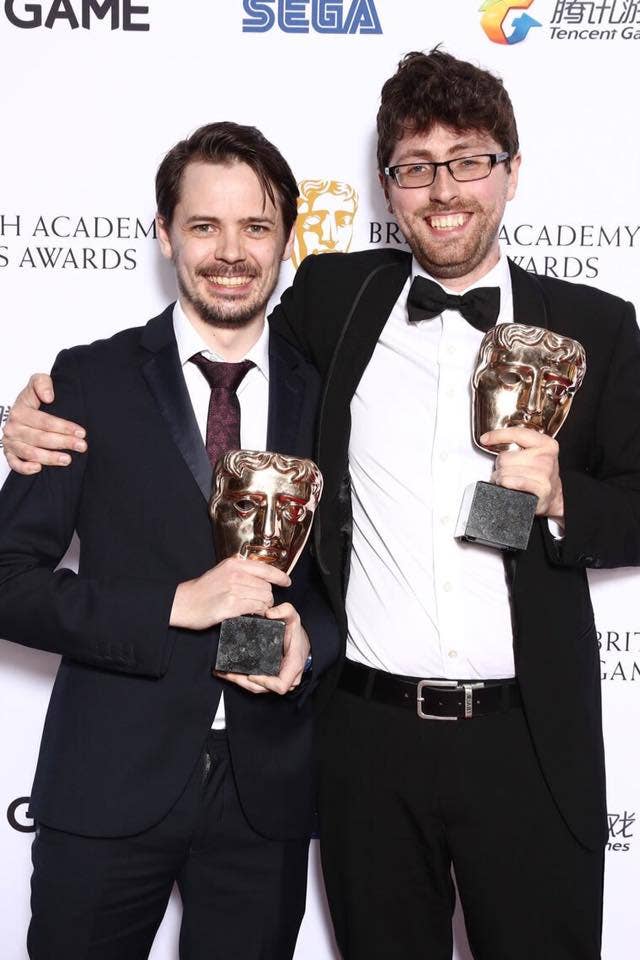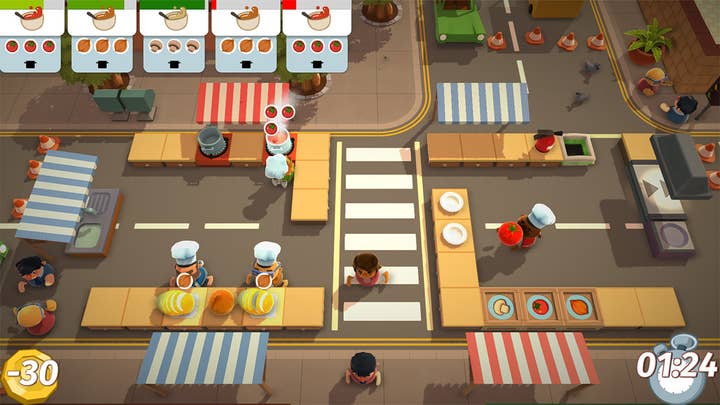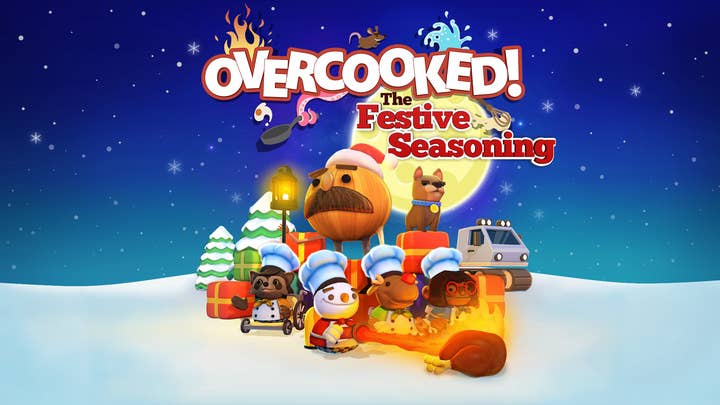Development by expo: How Ghost Town built Overcooked
We visit a house in Cambridge to uncover the secrets of BAFTA-winning Overcooked
Just minutes before walking through the door of Ghost Town's office, I had been to see Jagex.
It was quite the contrast. The RuneScape maker was just five minutes down the road (less if the traffic lights played nicely) and had freshly renovated offices, complete with pool table, games room, green-screened studio and a whole lot more. Ghost Town's office is a spare room in a terraced house on the outskirts of Cambridge. Jagex had entire walls painted in fantasy artwork; Ghost Town had a Baby Groot toy on the windowsill.
Phil Duncan, one half of the Ghost Town duo, observed that his room might not be quite up to Jagex's standards. I pointed out that I hadn't seen two BAFTA masks at Jagex's HQ.
"You could probably tell from our expression that we were not expecting to win those," says Duncan. "I want to go back and do a proper speech.
"It was only the day after when I realised that there were lots of different people who voted for it. It's not something we get to see. Most of the people in the industry that we know tell us it's great, because they're talking to our faces and most people aren't incredibly rude."

Overcooked, Ghost Town's first title, was released last year. The frantic kitchen multiplayer title was a hit with critics and was nominated for four BAFTAs, winning two: British Game and Family Game (it missed out on Multiplayer and Debut Game).
It's been a huge success for the team, but you wouldn't know it sitting in that room in Cambridge.
"Well, I did buy myself a new laptop," says Oli DeVine, the firm's other co-founder.
Duncan quips: "It's gone to our heads."
"I haven't bought a chair yet," Devine admits. "I really need a new chair."
"Alright, alright," says Duncan. "Hold on. Don't go throwing your money away."
Duncan and DeVine are a delightful pairing. The two have clearly been friends for a long time, first meeting at Frontier Developments before deciding to set out on their own. During our conversation, the two would frequently finish each other's stories - it made transcribing the whole thing extremely tricky.
This was a real indie developer. Two mates, joking around and coding stuff from the spare bedroom. Yet with a hit game on shelves, and awards coming in, I had to wonder how long this would last. Surely the next time I visit Ghost Town I'll be surrounded by staff in some plush office.
"I think being in charge of a large studio might just be my worst nightmare"
Oli DeVine, Ghost Town
"I like being small," DeVine says. "I think being in charge of a large studio might just be my worst nightmare. It seems so hard. I want to just be working on the code. And if I brought another coder in, I'd then have to be reading other people's code, I'd have to reveal that I can't actually read it."
Duncan adds: "Whenever we talk to businessy people, we confuse them because we say: 'We can now make stuff that appeals to less people. We can make less successful games.'
"We're certainly happy with the set-up. One of the advantages we have is that we can take slightly more creative risks. Our overheads are particularly low, so it isn't as important to us that the game has to sell 8m copies. We want to cling to that. Here we can get things wrong and change our minds. We both worked in AAA, and sometimes when an idea isn't working, it's too late, you've put too many man hours into it and you have to get it out now."
DeVine again: "Also, it is our risk. If we had a lot of people we were responsible for, I do think it would damage our process. If we took this risk with ten other people, I am not sure I could bring myself to do it."
Despite their issues with the AAA process, DeVine and Duncan speak fondly of their time at Frontier. In fact, they recommend future indie devs also try working for a larger outfit first.
"I don't see anything but positives from our time at Frontier," says Duncan. "Frontier was a bit of an anomaly in some ways because it used to do so many different types of projects. There were games for Wii, for Kinect, mobile games... "
DeVine jumps in: "A whole load of very different genres, which was very useful for learning how to do various different things. One of the big advantages of working for a large studio is that you get to be a specialist, whereas as an indie you really have to be a generalist."
Duncan concurs: "Especially when there's two of us, there are just so many different hats we have to wear. One day I could be an animator, or a 2D artist, or a 3D artist."
Back to DeVine: " I am handling every single aspect of programming, whilst dealing with putting in sound effects and that sort of thing. It is nice in a large studio to be able to go: "I'm going to get good at this one subject." So I do recommend it for people."

DeVine adds that whenever he had to learn anything new when creating Overcooked, he found the process very stressful.
"All that learning is taking me away from other things," he says. "It was particularly an issue with Overcooked, because we were literally living off of our savings. So I needed to learn how to do various porting to console tasks, and I was reading documentation feeling acutely aware that I needed to learn this quickly."
Duncan continues: "I remember learning rigging for the first time. I hadn't done it before. And I just remember the pressure, thinking: 'If this takes longer than three months, we are not going to be able to rig our characters. Sorry.'
DeVine again: "Basically, it was a case of: 'If I'm not smart enough to learn this, then it won't be finished'. It was terrifying."
"Basically, it was a case of: 'If I'm not smart enough to learn this, then it won't be finished'. It was terrifying"
Oli DeVine, Ghost Town
Duncan: "I am sure if you look at my rigs now, you'll think I didn't learn a great deal."
DeVine laughs: "I hope no coder ever looks at my code base. It's just horrendous."
Ghost Town created Overcooked out of a craving for old-school co-op multiplayer that you played with others in the same room. DeVine has two brothers while Duncan has three, and they both fondly remember those classic multiplayer experiences from when they were kids.
"We had parents sit us down in front of the TV to entertain ourselves with local multiplayer games," says Duncan. "We've lost that."
That was the genesis of the project, although being such a small team did create some issues.
"The downside of making a four-player game when there's only two of you is that you don't really get to do much play testing," laughs Duncan. That's why Ghost Town very quickly took the convention circuit.
"Our first ever convention was within a very short time of forming up as a proper studio," says DeVine.
Duncan interjects: "It was just a couple of months. Do you know Norwich Games Festival at all? That was the first place we took a build. It was a really ropey prototype. We just wanted to get it in front of some people as quickly as possible.
"We tested it on friends and other developers. But what you tend to get when you show it to game devs is that they give you advice on what you should do. When you show it to members of the public, they'll just go: 'This is bad'."
DeVine goes further: "Strangers tell you the problems, when you play with developers they try to give you solutions... they don't really tell you the problem that they're trying to solve. It can be quite annoying.
"Seeing people play makes a huge difference because you can see the problems they are having even if they don't realise they're having them."
Duncan says that conventions can be quite brutal. He recalls an incident where a kid was playing a game at EGX Rezzed, his dad asked him if it was any good and the kid said loudly: "No, it's boring." Right in front of the developer.
"That's why you take your game to conventions early, because that criticism hurts you a lot less early on," DeVine says. "If you find out your controls are terrible, and you've spent a year and a half working on it, then it's crushing. But if it's only been a couple of months, then you just shrug your shoulders and make it better. The game did change a lot from Norwich Game Festival.
"Every time we came back from an event we had a huge list of things we wanted to change. The design changed quite a fair bit from the early days"
Phil Duncan, Ghost Town
"It was useful going to conventions where the press weren't massively in attendance. Because you can then take a build that isn't going to get seen everywhere."
Duncan agrees: "I wouldn't advise taking a build you want to test to EGX, because it would just be horrendous for three days."
He continues: "Every time we came back from an event we had a huge list of things we wanted to change. The design changed quite a fair bit from the early days. In our heads, it was a game about cooking, there would be different kitchens around the world and there would be different types of food. And those different foods were going to be the focus. But then we took it to conventions and people didn't care about the recipes. They were far more interested in the level design and how that made them have to react. That was a shift for us, and made us think about what more we could do with the levels and how we could exploit teamwork that way, instead of introducing thousands of recipes.
"The scoring system changed as well. It was more a survival game with health, and it was a case of how long can you go. But we found that people were finding that too stressful."
DeVine adds: "We also made a lot of changes to introduce chaos of various kinds. That was a big focus. When things went wrong, people were having more fun."
Duncan continues: "We were pretty pragmatic about it. We knew there would be some problems. We had done enough user testing in the past, so we know to just sit there and bite your lip and take it. That is part of the process and the game will be better as a result. Even though it can be quite painful."
Of course, taking such early builds to conventions meant that DeVine often found himself fixing bugs on the show floor.
"I had my laptop at the side and I would hot fix stuff and upload a new build to the machine," he says. "In the early conventions we had those issues where you put the game in front of people and they'd play it in a way you weren't expecting."
As the game progressed towards deadline the need for a publisher started to weigh on the minds of the developers. Ghost Town was in need of some QA, marketing and PR support, and submitted the title to Team17.
The company were fans of the game, but they just didn't have the capacity to take it on. A few months later, the firm found the time.

"They had been playing the prototype on and off, and they just found this window to fit us in," Duncan remembers. "It was about two months before launch and we were still talking to publishers. We'd hoped to have had it nailed down by then, but these things take time."
Within days, Duncan was on a plane bound to E3.
"I'm not sure we had even signed the contract by the time we went to E3," he says
DeVine adds: "We might have just signed. Like the day before."
"People went to see Yooka-Laylee and we were like: 'Oh hello, have you seen this marvellous cooking game?' Of course, they hadn't"
Phil Duncan, Ghost Town
"At E3, it was really good because we were situated right next to Yooka-Laylee. We had done quite well with UK games press before we got signed, but it is difficult for a two-person team in England to get any attention from the US. So E3 was good, because they came to see Yooka-Laylee and found us."
Duncan: "People went to see Yooka-Laylee and we were like: 'Oh hello, have you seen this marvellous cooking game?' Of course, they hadn't."
Then came the anti-climax of release. Overcooked had done well, particularly with critics, but DeVine and Duncan were still working full time on it. Team17 wanted a boxed version of the game, and so the duo were producing DLC to ensure the disc edition matched the price of the digital version.
"We didn't really stop working flat out on the game until December," Duncan says.
They're still working on it now. DeVine pointed to the Nintendo Switch dev kit situated under his desk.
"I was up late last night on it," he says.
Duncan adds: "It's not part of our five-year plan to be making Overcooked content. But there was a lot of content we just couldn't fit in. There was a point towards the last few months of the project when the stuff you were telling yourself was definitely going in sooner or later, just didn't."
"Like all those days of polish we promised ourselves," jokes Devine.
"Yeah," concludes Duncan. "I'm sure we'll get around to that."
